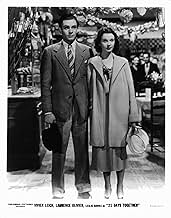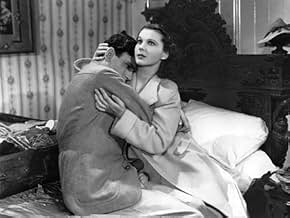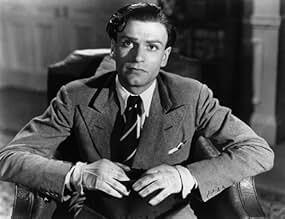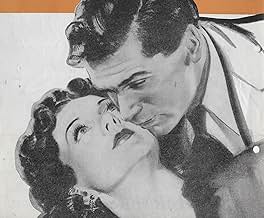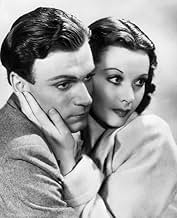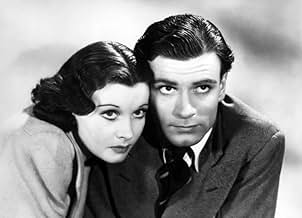IMDb-BEWERTUNG
6,1/10
1359
IHRE BEWERTUNG
Füge eine Handlung in deiner Sprache hinzuAfter Larry accidentally kills his lover Wanda's estranged blackmailing husband, someone else is arrested for the crime. Larry and Wanda nervously await the verdict: if the innocent suspect ... Alles lesenAfter Larry accidentally kills his lover Wanda's estranged blackmailing husband, someone else is arrested for the crime. Larry and Wanda nervously await the verdict: if the innocent suspect is found guilty then Larry will give himself up.After Larry accidentally kills his lover Wanda's estranged blackmailing husband, someone else is arrested for the crime. Larry and Wanda nervously await the verdict: if the innocent suspect is found guilty then Larry will give himself up.
- Regie
- Drehbuch
- Hauptbesetzung
Elliott Mason
- Frau. Grunlich
- (as Elliot Mason)
Howard Douglas
- Man Asking for Cigarette
- (Nicht genannt)
Empfohlene Bewertungen
But not much plot. This was obviously a vehicle for its stars who were married at the time. Lawrence Olivier is quite wooden and stagey, Vivien glows, the camera just loves her. The story is a neat twist on ethics and morality with the wayward no-good brother standing firm for honesty and the uptight, successful barrister brother - on his way to becoming a judge - ready to hang an innocent man for a crime he did not commit. The twenty one days refer to the length of time the trial of this innocent man is going to take. The technical quality of the film was poor, the background of London was nearly washed out and the streets were obviously studio sets, not surprising, as it was filmed at the start of WW2. 5 out of 10, the ending was a bit of a let down and Larry really hams it up.
21 Days is directed by Basil Dean and adapted to screenplay by the director and Graham Greene from John Galsworthy's play The First and Last. It stars Vivien Leigh, Laurence Olivier, Leslie Banks, Francis L. Sullivan and David Horne.
When Larry Durrant (Olivier) accidentally kills his lover's husband, he decides to hide his crime and the couple embark on a whirlwind romance for the next twenty one days. However, with an innocent dupe on trial for the murder, Durrant's conscience begins to get the better of him.
If it didn't feature Olivier and Leigh then this would have been consigned to the forgotten bin and sealed up post haste. That the stars give it a curiosity value is a given, but one peak at the meagre back story backs up the fact that it really is rather a dull movie. Film was wrapped in 1938 but sat on the shelf for two years and was only released once Olivier and Leigh became big names in 1940. The two stars were more interested in playing footsie under the table than putting any acting depth into the production, something which greatly annoyed director Dean as he was trying to make a gripping crime drama. In fact Viv and Larry were so unhappy with how the film ended up, they reportedly walked out of a screening of it at the halfway point!
Picture is clearly meant to be a scathing observation on the folly of criminal law, wrapped around a male protagonist battling his moral codes as his heart goes pitter patter for a dame. Yet the picture rarely reaches dramatic heights, playing out more as a movie about young lovers inconvenienced by an accident, than one about a cruel twist of fate so pay your penance you loser. Olivier gives good quality mental anguish, again that is a given, but Leigh is just on the sidelines looking pretty and rarely impacting on the narrative. The other cast members work well enough, but everyone seems confused as to just what sort of tone to aim for, in fact taking their queues from Larry and Viv. While the ending lacks an edge, playing out more as a cheap cop out than anything else, geared once again towards how lovely the central couple are together.
Somehow finding its way into a British film noir DVD collection, that's a bit of a bum steer. However, little snippets of visual pleasures do provide bright spots in the viewing experience. The few scenes involving a foggy London of wet back streets and street lamps hint at where the director hoped his movie would dwell, and with cinematographer Jan Stallick photographing continually with shadows prominent, there's just enough to keep it from being a complete wash out on the tech side of things. Ultimately it's very disjointed, a tonally confusing picture in search of a more dramatic and thrilling home, director Dean knew it, producer Alexander Korda knew it, and crucially, so did Olivier and Leigh. Only the most staunch (biased) fans of the two stars can seriously think this is a good movie. 5/10
When Larry Durrant (Olivier) accidentally kills his lover's husband, he decides to hide his crime and the couple embark on a whirlwind romance for the next twenty one days. However, with an innocent dupe on trial for the murder, Durrant's conscience begins to get the better of him.
If it didn't feature Olivier and Leigh then this would have been consigned to the forgotten bin and sealed up post haste. That the stars give it a curiosity value is a given, but one peak at the meagre back story backs up the fact that it really is rather a dull movie. Film was wrapped in 1938 but sat on the shelf for two years and was only released once Olivier and Leigh became big names in 1940. The two stars were more interested in playing footsie under the table than putting any acting depth into the production, something which greatly annoyed director Dean as he was trying to make a gripping crime drama. In fact Viv and Larry were so unhappy with how the film ended up, they reportedly walked out of a screening of it at the halfway point!
Picture is clearly meant to be a scathing observation on the folly of criminal law, wrapped around a male protagonist battling his moral codes as his heart goes pitter patter for a dame. Yet the picture rarely reaches dramatic heights, playing out more as a movie about young lovers inconvenienced by an accident, than one about a cruel twist of fate so pay your penance you loser. Olivier gives good quality mental anguish, again that is a given, but Leigh is just on the sidelines looking pretty and rarely impacting on the narrative. The other cast members work well enough, but everyone seems confused as to just what sort of tone to aim for, in fact taking their queues from Larry and Viv. While the ending lacks an edge, playing out more as a cheap cop out than anything else, geared once again towards how lovely the central couple are together.
Somehow finding its way into a British film noir DVD collection, that's a bit of a bum steer. However, little snippets of visual pleasures do provide bright spots in the viewing experience. The few scenes involving a foggy London of wet back streets and street lamps hint at where the director hoped his movie would dwell, and with cinematographer Jan Stallick photographing continually with shadows prominent, there's just enough to keep it from being a complete wash out on the tech side of things. Ultimately it's very disjointed, a tonally confusing picture in search of a more dramatic and thrilling home, director Dean knew it, producer Alexander Korda knew it, and crucially, so did Olivier and Leigh. Only the most staunch (biased) fans of the two stars can seriously think this is a good movie. 5/10
You'll get hooked on this right away but then annoyed at the way it takes so long to get to the point. Director, Basil Dean's lugubrious pace and humourless direction tries too hard to build tension rather than developing the story or making us get to know his cast.
According to Mr Dean he was not entirely to blame. Studio boss Alexander Korda was so underwhelmed by Dean's direction that he started to re-shoot and rewrite scenes himself. This conflict gives the picture a disjointed feel but the main issue is that the balance is really wrong. About half the film is taken up by the (anti) climatic court case which is meant to get you on the edge of your seat. It achieves that ambition but only because you're yelling "get on with it!" This is one of the dullest court room scenes I've seen - where is William Powell or a Barrymore brother when you need them ? What's sacrificed for this pseudo-arty tension trope is that we don't get time to know the characters straight away. More time should have been devoted to that because it takes too long to draw you in.
On the plus side, it looks good, it's full of mood, clever lighting and the inevitable 1930s London fog - the camerawork also is pretty impressive. The acting, as you'd expect from this lot is first rate but it's the story which doesn't grab you. Such a tale about abuse, murder, deception and blackmail handled by another director could have been the most exciting thing since sliced bread but this is actually less exciting than that aforementioned piece of bread.
What does eventually makes you sit up and take notice is the brilliant cameo from Hay Petrie as a down and out ex-vicar. You then wish you'd been paying more attention earlier! That's what happens with this - once you've started you really want to find out what happens next but your brain keeps trying to switch off.
Despite what some reviewers have said, this is not a bad film - it's just frustrating because you know that it could have been made better. For example, had Hitchcock been in the chair this might have been a classic. As it stands it's just ok.
One interesting thing to see is Mr Olivier not playing the alpha male - as the weak willed looser, the unsuccessful brother, he's remarkably believable. That's until you realise that this young actor has, just a few weeks earlier married probably the most beautiful woman in the world.
According to Mr Dean he was not entirely to blame. Studio boss Alexander Korda was so underwhelmed by Dean's direction that he started to re-shoot and rewrite scenes himself. This conflict gives the picture a disjointed feel but the main issue is that the balance is really wrong. About half the film is taken up by the (anti) climatic court case which is meant to get you on the edge of your seat. It achieves that ambition but only because you're yelling "get on with it!" This is one of the dullest court room scenes I've seen - where is William Powell or a Barrymore brother when you need them ? What's sacrificed for this pseudo-arty tension trope is that we don't get time to know the characters straight away. More time should have been devoted to that because it takes too long to draw you in.
On the plus side, it looks good, it's full of mood, clever lighting and the inevitable 1930s London fog - the camerawork also is pretty impressive. The acting, as you'd expect from this lot is first rate but it's the story which doesn't grab you. Such a tale about abuse, murder, deception and blackmail handled by another director could have been the most exciting thing since sliced bread but this is actually less exciting than that aforementioned piece of bread.
What does eventually makes you sit up and take notice is the brilliant cameo from Hay Petrie as a down and out ex-vicar. You then wish you'd been paying more attention earlier! That's what happens with this - once you've started you really want to find out what happens next but your brain keeps trying to switch off.
Despite what some reviewers have said, this is not a bad film - it's just frustrating because you know that it could have been made better. For example, had Hitchcock been in the chair this might have been a classic. As it stands it's just ok.
One interesting thing to see is Mr Olivier not playing the alpha male - as the weak willed looser, the unsuccessful brother, he's remarkably believable. That's until you realise that this young actor has, just a few weeks earlier married probably the most beautiful woman in the world.
There are many barriers to love, most can be overcome, but is murder one such obstacle, can a couple allow an innocent man to take the blame for their crime?
It's not as good as some of the movies I've seen from this era and in the same genre, but it is good, it's very watchable, and let's be honest, anything that features Vivian Leigh is worth watching.
It's perhaps a lack of suspense that is the stumbling block, you're left in no doubt as to the ending.
It's a good watch though, nicely made, and very well acted, 6/10.
It's not as good as some of the movies I've seen from this era and in the same genre, but it is good, it's very watchable, and let's be honest, anything that features Vivian Leigh is worth watching.
It's perhaps a lack of suspense that is the stumbling block, you're left in no doubt as to the ending.
It's a good watch though, nicely made, and very well acted, 6/10.
Well played out story of a weak man(Olivier) who kills someone thru self-defense and then decides to hide the fact with his girlfriend(Leigh). His brother(running for Judge duties) helps in the cover-up. Unexpected ending a little disappointing, but follows with the character.
Wusstest du schon
- WissenswertesThe film was shot in 1937 but released on January 7, 1940. William Dewhurst (Lord Chief Justice) died on October 26, 1937. His only child, Paul, died in 1937 fighting in the Spanish Civil War, only a few months before Dewhurst's own demise.
- PatzerAt the end, when Wanda (Vivien Leigh) is chasing Larry (Laurence Olivier) through the streets, she isn't carrying anything. The camera goes to Larry, and when it goes back to her, she's carrying a newspaper as she's still running. Once again the camera goes back to Larry, and the next shot of her, she once again isn't carrying a newspaper but stops to buy one then continues to run after him.
- VerbindungenFeatured in Der Film, der zur Legende wurde: Vom Winde verweht (1988)
Top-Auswahl
Melde dich zum Bewerten an und greife auf die Watchlist für personalisierte Empfehlungen zu.
- How long is 21 Days Together?Powered by Alexa
Details
- Erscheinungsdatum
- Herkunftsland
- Sprachen
- Auch bekannt als
- 21 Days Together
- Drehorte
- Southend-on-Sea, Essex, England, Vereinigtes Königreich(Kursaal amusement park visited by Larry and Wanda)
- Produktionsfirma
- Weitere beteiligte Unternehmen bei IMDbPro anzeigen
- Laufzeit1 Stunde 12 Minuten
- Farbe
- Seitenverhältnis
- 1.37 : 1
Zu dieser Seite beitragen
Bearbeitung vorschlagen oder fehlenden Inhalt hinzufügen


